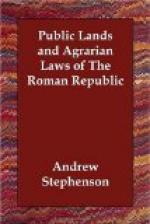Pliny confirms this statement concerning Crassus, but adds that Sulla was even richer.[15] Plutarch gives us fuller details and also explains the origin of the colossal fortune of Crassus. According to him Crassus had 300 talents ($345,000), with which to commence. Upon his departure for the Parthian war in which he lost his life, he made an inventory of his property and found that he was possessed of 7,100 talents, $8,165,000, double what Cicero attributes to him. How did Crassus increase his fortune so enormously? Plutarch says that he bought the property confiscated by Sulla at a very low figure. Then, he had a great number of slaves distinguished for their talents; lecturers, writers, bankers, business men, physicians, and hotel-keepers, who turned over to him the benefits which they realized in their diverse industries. Moreover, he had among his slaves 500 masons and architects. Rome was built almost entirely of wood and the houses were very high, consequently fires were frequent and destructive. As soon as a fire broke out, Crassus hastened to the place with his throng of slaves, bought the now burning buildings—as well as those threatened—at a song, and then set his slaves to work extinguishing the fires. By this means he had become possessed of a large[16] part of Rome.
Some other facts confirm that which Plutarch tells us of Crassus. Athenaeus[17] says that it was not rare to find Roman citizens possessed of 20,000 slaves. At the commencement of the civil war between Caesar and Pompey, the future dictator found opposed to him, in Picenum, Domitius[18] Ahenobarbus at the head of thirty cohorts. Domitius seeing his troops wavering, promised to each of them four jugera out of his own possessions, and a proportionate part to the centurians and veterans. What must have been the fortune of a man who was able to distribute out of his own lands, and surely without bankrupting himself, about 100,000 jugera?
[Footnote 1: Cicero says these exactions were common and that the provinces were even restrained from complaining. Verres apologized for his exactions by saying that he simply followed the common example. In Verrem, II, 1-3, 17.]
[Footnote 2: “Parentes aut parvi liberi militum, ut quisque potentiori confinis erat, sedibus pellebantur.” Sall., Jugertha, 41. Horace, Ode II, 18.]
[Footnote 3: Duruy, Hist. des Romains, II, 46-47.]
[Footnote 4: “Sex domini semissem Africae possidebant.” Hist. Nat., XVIII, 7.]
[Footnote 5: Seneca, Epist., 89.]
[Footnote 6: Petronius, Sat., 48: VII. calendas sextilis in praedio Cumano, quod est Trimalchionis, nati sunt pueri, XXX, puellae, XL; sublata in horreum, ex area, tritici millia modium quingenta; boves domiti quingenti ... eodem die incendium factum est in hortis Pompeianis, ortum ex aedibus nastae, villici.]
[Footnote 7: Quid? inquit Trimalchio: quando mihi Pompeiani horti emti sunt? Anno priore, inquit actuarius. (Ibid. 53.)]




